|
|
|
Sort Order |
|
|
|
Items / Page
|
|
|
|
|
|
|
| Srl | Item |
| 1 |
ID:
168253
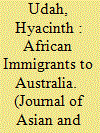

|
|
|
|
|
| Summary/Abstract |
The purpose of this paper is to examine the employment experiences of immigrants of African background in the Australian labor market. Drawing on the findings from a qualitative study conducted in South East Queensland, the paper identifies several barriers and challenges faced by Africans to meaningful employment and labor market success. The paper indicates the need to develop targeted policies to eliminate employment discrimination, reduce barriers to meaningful employment for good settlement and successful integration of African immigrants to Australia.
|
|
|
|
|
|
|
|
|
|
|
|
|
|
|
|
| 2 |
ID:
151556
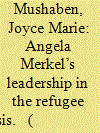

|
|
|
|
|
| Summary/Abstract |
“What Merkel’s critics underestimate is the extent to which her proactive policies of the past decade encouraging integration and ‘intercultural opening’ have produced an even bigger paradigm shift...”
|
|
|
|
|
|
|
|
|
|
|
|
|
|
|
|
| 3 |
ID:
086660
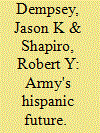

|
|
|
|
|
| Publication |
2009.
|
| Summary/Abstract |
Using data from the Citizenship & Service: 2004 Survey of Army Personnel, a probability sample of active duty soldiers and officers, this study examines key questions concerning success in the military for racial and ethnic minorities. It focuses on the degree to which Hispanics are integrated into the Army and compares the experiences of Hispanics to the experiences of whites and blacks. After assessing why Hispanics join the Army and choose their occupational specialties, the study looks at how Hispanics perceive Army life, their personal experiences with discrimination, and the progress of the Army in the area of racial and ethnic integration. By comparing the attitudes of Hispanics to those of whites and blacks, it explores the degree to which race and ethnicity influence life in the Army and the implication of this for the military's future.
|
|
|
|
|
|
|
|
|
|
|
|
|
|
|
|
| 4 |
ID:
127848
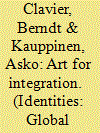

|
|
|
|
|
| Publication |
2014.
|
| Summary/Abstract |
Cities increasingly use artistic and cultural activities to promote active citizenship and social cohesion. We suggest that city-sponsored cultural and artistic practices in Sweden are finding a new discursive context in migration. In this article, we look at two artistic and cultural institutions in Malmö, Sweden: Arena 305 and Drömmarnas hus. We develop a typology of governmentalisation based on the work of Nicholas Rose and Peter Miller, which allows us to describe the governing activity of Arena 305 and Drömmarnas hus. What becomes visible is the discrepancy between the moral form of the political rationalities and the technologies of government: even though institutions may harbour ideals and principles of inclusion, they are perfectly capable of sustaining activities that brighten the very boundaries they set out to challenge.
|
|
|
|
|
|
|
|
|
|
|
|
|
|
|
|
| 5 |
ID:
151100
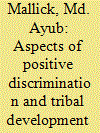

|
|
|
|
|
| Summary/Abstract |
Protective policies are essential for individual development and group mobility.
Positive discriminatory efforts seek to reduce group inequalities and to rectify
the consequences of group discrimination. Reservations in the fields of politics,
education and employment aimed at protecting tribal culture and tradition have
achieved strikingly little. Protection of land and life support system has been
poorly implemented. There have been no marked improvements in their social
conditions. Planned intervention has not improved the occupational and educational
levels of tribals. Non-tribals do not treat them equally. Apart from developing
entrepreneurship, follow-up action in providing developmental benefits to
tribals should be made. The single-stroke formula of providing loans and facilities
is unsuited to the development needs of the area. Social capital formation
is needed to ensure justice, or to provide socio-economic justice, which was
traditionally present in the tribal economy and society.
|
|
|
|
|
|
|
|
|
|
|
|
|
|
|
|
| 6 |
ID:
066214
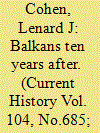

|
|
|
| 7 |
ID:
176999
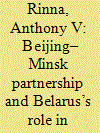

|
|
|
|
|
| Summary/Abstract |
China’s deepening ties with the Republic of Belarus, combined with the latter’s geographic position between the EU and Russia (the veritable leader of the Eurasian Economic Union), stands to potentially benefit China’s bid to deepen economic cooperation with the European Union. More specifically, enhanced collaboration between Beijing and Minsk helps the PRC develop relations with the Eurasian Economic Union (essential to China’s ambitions to augment cooperation with Europe) while simultaneously providing a geographic avenue for China into the central and eastern European regions of the EU for the Belt and Road Initiative (BRI). Nevertheless, the degree to which Beijing’s stronger relations with Minsk will serve Chinese interests in connecting with Europe will depend in large on whether or not Belarus and the EU can overcome significant differences in their relationship, as well as whether the relationship between the European Union and the Eurasian Economic Union (as a partner of the BRI) takes on a cooperative or a competitive nature.
|
|
|
|
|
|
|
|
|
|
|
|
|
|
|
|
| 8 |
ID:
164262
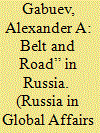

|
|
|
|
|
| Summary/Abstract |
Conceived in the fall of 2013, China’s “Belt and Road” initiative in the follow-ing five years became one of the most discussed issues among Russian inter-national relations experts. The discussions produced a plethora of academic, expert and op-ed articles designed to explain to society and the political elite what the “Belt and Road” initiative actually was and what we should do with it. Albeit differing methodologically, stylistically and ideologically, the articles on the whole testify to the existence of certain political discourse specific to Russia
|
|
|
|
|
|
|
|
|
|
|
|
|
|
|
|
| 9 |
ID:
073205
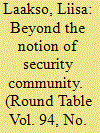

|
|
|
| 10 |
ID:
148340
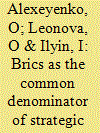

|
|
|
|
|
| Summary/Abstract |
GLOBALIZATION and regionalization have set a trend for new associations of states such as regional and interregional organizations and dialogue forums to emerge to take over decision-making on some international issues. New regional organizations and dialogue forums are set up with the participation of emergent political players, actors that are vehicles of an innovative format of international cooperation. BRICS, which brings together five key regional powers representing four continents and four major civilizations, is a splendid example of such an association.
|
|
|
|
|
|
|
|
|
|
|
|
|
|
|
|
| 11 |
ID:
069086
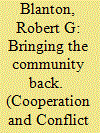

|
|
|
| 12 |
ID:
093232
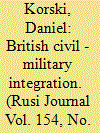

|
|
|
|
|
| Publication |
2009.
|
| Summary/Abstract |
British campaigns in Iraq and Afghanistan exposed a lack of institutional memory of the lessons of previous interventions. Twenty-first century security challenges have defied the traditional organisational boundaries within (and between) the military, civil service and government. Although there have been efforts to move towards the so-called comprehensive approach and create truly joint frameworks, the overhaul of government institutions has not been radical enough. A fresh, bold set of reforms is required to rework the institutions of state power to be effective in the present security environment
|
|
|
|
|
|
|
|
|
|
|
|
|
|
|
|
| 13 |
ID:
137929
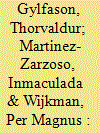

|
|
|
|
|
| Summary/Abstract |
Using a panel gravity model of trade for the period 1995–2010, this paper estimates the potential for increased intra-regional trade among 10 countries of the southern and eastern Mediterranean coast. It examines how closer integration through the EU’s revised neighborhood policy can encourage democratisation and conflict resolution. The main results indicate that while the gains realized to date from regional integration have been small, significant potential gains from deep integration exist. The paper proposes that the EU starts by negotiating deep and comprehensive free trade agreements with Egypt, Israel and Jordan provided these countries also negotiate them with each other.
|
|
|
|
|
|
|
|
|
|
|
|
|
|
|
|
| 14 |
ID:
065458
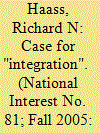

|
|
|
| 15 |
ID:
189866
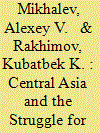

|
|
|
|
|
| Summary/Abstract |
The paper discusses the “struggle for Soviet legacy’ as a key concept for
understanding relations in Central Asia. This struggle is a path of dependent
development, in which the resources and values created in Soviet times
determine interstate relations in the 21st century. The authors argue that in
Central Asia this legacy rests mostly on the mega industries created during
the Soviet era, and national resources and practices of their distribution.
The paper concludes that in fact the struggle for Soviet legacy means
confrontation over the contours of new geoeconomics in Asia.
|
|
|
|
|
|
|
|
|
|
|
|
|
|
|
|
| 16 |
ID:
075383
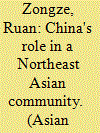

|
|
|
| 17 |
ID:
122664
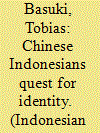

|
|
|
| 18 |
ID:
180325
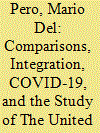

|
|
|
|
|
| Summary/Abstract |
As it happened, when the Italian government finally opted for a drastic lockdown to address the COVID-19 pandemic, I was still commuting on a biweekly basis to the lovely town of Menton, on the Cote d’Azur, where my university has a stunning beachside campus. The announcement of the lockdown conveniently followed a weekend when legions of skiers—buoyed by heavy snowfalls and the warm March weather—had inundated ski resorts, giving a further, unneeded spur to the spread of the virus. In Menton, just four kilometers from the Italian border, people seemed unconcerned. The annual three-week Fête du Citron, the festival of lemon, an event that draws more than 200,000 people to the little town every year, was under way (only the last week was eventually cancelled); lessons in a packed, windowless, and overheated amphitheater continued unabated; and the owner of the hotel where I was staying made a point of vigorously shaking my hand when I arrived. In the many WhatsApp groups and Facebook pages of the Italian academic diaspora—itself the byproduct of globalization and deep cuts to public education in Italy, as many colleagues know—we all wondered: how could this be possible? How could the rest of Europe, and France overall, sleepwalk while the pandemic was spreading unchecked in Italy, putting hospitals’ intensive care units under strain—such as those of Lombardy, Veneto, and Emilia-Romagna, the three most affected regions boasting some of the best hospitals in the world—and killing thousands of people in some of the wealthiest areas and cities of the continent?
|
|
|
|
|
|
|
|
|
|
|
|
|
|
|
|
| 19 |
ID:
074551
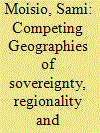

|
|
|
|
|
| Publication |
2006.
|
| Summary/Abstract |
European integration is often naturalised, so that the movement of a particular state towards integration, or away from it, is understood as being underpinned by eternal and everlasting national forces. The political struggles within the EU applicant states have not inspired scholars to produce sensitive studies of the "national debates" carried on in applicant states, even though this is exactly the field of political action where politico-geographical categories such as national identity, sovereignty and security come to be enthusiastically articulated. This paper both seeks to explain the struggle over Finland's decision to join the EU by focusing on the argumentation of those actors who "lost" the political struggle, and introduces the geographies that the opponents of Finnish EU membership produced. It is therefore aimed at illustrating the politics that underlay the geographical articulations which referred to either "national identity" or "sovereignty". The purpose of doing this is to trace the competing geographies involved in the Finnish EU struggle and to point out that they were indeed based on long historical traditions which competing political actors used as a source of legitimation in their political action. Most of the themes highlighted by the No-EU camp are prominent in contemporary EU debates, too.
|
|
|
|
|
|
|
|
|
|
|
|
|
|
|
|
| 20 |
ID:
178028
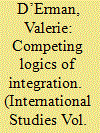

|
|
|
|
|
| Summary/Abstract |
The European Union’s (EU) external trade policy has long been championed by scholars and practitioners alike as one of the great accomplishments for European integration. The UK’s exit from the EU in 2020 offers many precedents; one of which is the current negotiation of a trade deal between the EU and a former important member of the single market. This paper outlines the trade negotiation process between the EU and the UK and the resulting Trade and Cooperation Agreement (TCA) against the backdrop of the COVID-19 pandemic to forecast the broader potential evolution of EU trade policy. The increasing visibility of nationalist and protectionist statements in various instances of political communication suggests a major shift in multilateral norms away from the liberal-international emphasis on heightened trade and interdependence. The implications for the EU external trade policy are a re-direction of efforts toward internal single market cohesion, and a more cautious approach to future potential trade agreements.
|
|
|
|
|
|
|
|
|
|
|
|
|
|
|
|
|
|
|
|
|